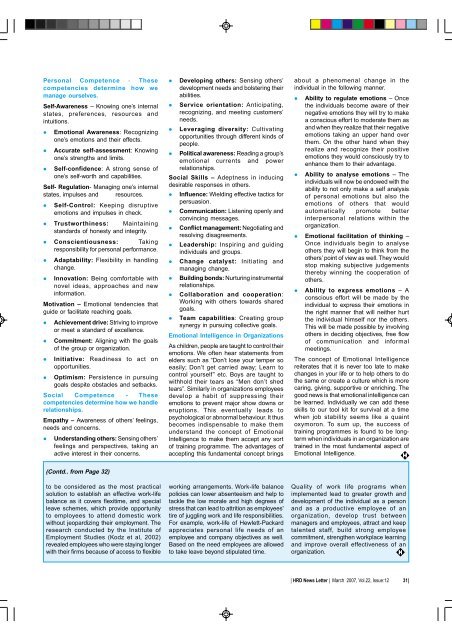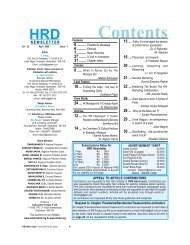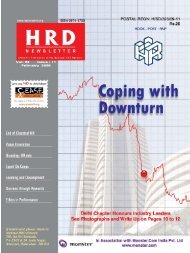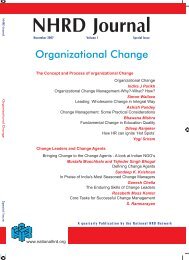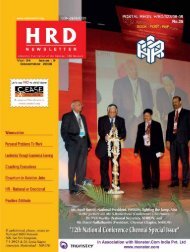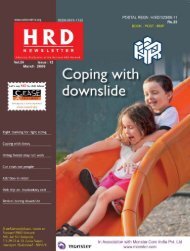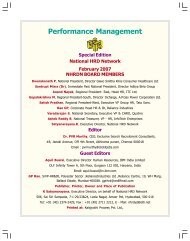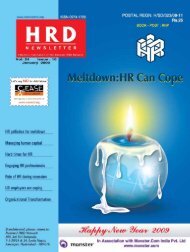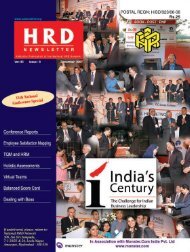Performance Management - National HRD Network
Performance Management - National HRD Network
Performance Management - National HRD Network
You also want an ePaper? Increase the reach of your titles
YUMPU automatically turns print PDFs into web optimized ePapers that Google loves.
Personal Competence - These<br />
competencies determine how we<br />
manage ourselves.<br />
Self-Awareness – Knowing one’s internal<br />
states, preferences, resources and<br />
intuitions.<br />
l Emotional Awareness: Recognizing<br />
one’s emotions and their effects.<br />
l<br />
Accurate self-assessment: Knowing<br />
one’s strengths and limits.<br />
l Self-confidence: A strong sense of<br />
one’s self-worth and capabilities.<br />
Self- Regulation- Managing one’s internal<br />
states, impulses and resources.<br />
l Self-Control: Keeping disruptive<br />
emotions and impulses in check.<br />
l Trustworthiness: Maintaining<br />
standards of honesty and integrity.<br />
l Conscientiousness: Taking<br />
responsibility for personal performance.<br />
l Adaptability: Flexibility in handling<br />
change.<br />
l Innovation: Being comfortable with<br />
novel ideas, approaches and new<br />
information.<br />
Motivation – Emotional tendencies that<br />
guide or facilitate reaching goals.<br />
l Achievement drive: Striving to improve<br />
or meet a standard of excellence.<br />
l Commitment: Aligning with the goals<br />
of the group or organization.<br />
l Initiative: Readiness to act on<br />
opportunities.<br />
l Optimism: Persistence in pursuing<br />
goals despite obstacles and setbacks.<br />
Social Competence - These<br />
competencies determine how we handle<br />
relationships.<br />
Empathy – Awareness of others’ feelings,<br />
needs and concerns.<br />
l<br />
Understanding others: Sensing others’<br />
feelings and perspectives, taking an<br />
active interest in their concerns.<br />
(Contd.. from Page 32)<br />
to be considered as the most practical<br />
solution to establish an effective work-life<br />
balance as it covers flexitime, and special<br />
leave schemes, which provide opportunity<br />
to employees to attend domestic work<br />
without jeopardizing their employment. The<br />
research conducted by the Institute of<br />
Employment Studies (Kodz et al, 2002)<br />
revealed employees who were staying longer<br />
with their firms because of access to flexible<br />
l Developing others: Sensing others’<br />
development needs and bolstering their<br />
abilities.<br />
l Service orientation: Anticipating,<br />
recognizing, and meeting customers’<br />
needs.<br />
l Leveraging diversity: Cultivating<br />
opportunities through different kinds of<br />
people.<br />
l Political awareness: Reading a group’s<br />
emotional currents and power<br />
relationships.<br />
Social Skills – Adeptness in inducing<br />
desirable responses in others.<br />
l Influence: Wielding effective tactics for<br />
persuasion.<br />
l Communication: Listening openly and<br />
convincing messages.<br />
l Conflict management: Negotiating and<br />
resolving disagreements.<br />
l Leadership: Inspiring and guiding<br />
individuals and groups.<br />
l Change catalyst: Initiating and<br />
managing change.<br />
l Building bonds: Nurturing instrumental<br />
relationships.<br />
l Collaboration and cooperation:<br />
Working with others towards shared<br />
goals.<br />
l Team capabilities: Creating group<br />
synergy in pursuing collective goals.<br />
Emotional Intelligence in Organizations<br />
As children, people are taught to control their<br />
emotions. We often hear statements from<br />
elders such as “Don’t lose your temper so<br />
easily; Don’t get carried away; Learn to<br />
control yourself” etc. Boys are taught to<br />
withhold their tears as “Men don’t shed<br />
tears”. Similarly in organizations employees<br />
develop a habit of suppressing their<br />
emotions to prevent major show downs or<br />
eruptions. This eventually leads to<br />
psychological or abnormal behaviour. It thus<br />
becomes indispensable to make them<br />
understand the concept of Emotional<br />
Intelligence to make them accept any sort<br />
of training programme. The advantages of<br />
accepting this fundamental concept brings<br />
working arrangements. Work-life balance<br />
policies can lower absenteeism and help to<br />
tackle the low morale and high degrees of<br />
stress that can lead to attrition as employees'<br />
tire of juggling work and life responsibilities.<br />
For example, work-life of Hewlett-Packard<br />
appreciates personal life needs of an<br />
employee and company objectives as well.<br />
Based on the need employees are allowed<br />
to take leave beyond stipulated time.<br />
about a phenomenal change in the<br />
individual in the following manner.<br />
l Ability to regulate emotions – Once<br />
the individuals become aware of their<br />
negative emotions they will try to make<br />
a conscious effort to moderate them as<br />
and when they realize that their negative<br />
emotions taking an upper hand over<br />
them. On the other hand when they<br />
realize and recognize their positive<br />
emotions they would consciously try to<br />
enhance them to their advantage.<br />
l Ability to analyse emotions – The<br />
individuals will now be endowed with the<br />
ability to not only make a self analysis<br />
of personal emotions but also the<br />
emotions of others that would<br />
automatically promote better<br />
interpersonal relations within the<br />
organization.<br />
l Emotional facilitation of thinking –<br />
Once individuals begin to analyse<br />
others they will begin to think from the<br />
others’ point of view as well. They would<br />
stop making subjective judgements<br />
thereby winning the cooperation of<br />
others.<br />
l Ability to express emotions – A<br />
conscious effort will be made by the<br />
individual to express their emotions in<br />
the right manner that will neither hurt<br />
the individual himself nor the others.<br />
This will be made possible by involving<br />
others in deciding objectives, free flow<br />
of communication and informal<br />
meetings.<br />
The concept of Emotional Intelligence<br />
reiterates that it is never too late to make<br />
changes in your life or to help others to do<br />
the same or create a culture which is more<br />
caring, giving, supportive or enriching. The<br />
good news is that emotional intelligence can<br />
be learned. Individually we can add these<br />
skills to our tool kit for survival at a time<br />
when job stability seems like a quaint<br />
oxymoron. To sum up, the success of<br />
training programmes is found to be longterm<br />
when individuals in an organization are<br />
trained in the most fundamental aspect of<br />
Emotional Intelligence.<br />
u H<br />
Quality of work life programs when<br />
implemented lead to greater growth and<br />
development of the individual as a person<br />
and as a productive employee of an<br />
organization, develop trust between<br />
managers and employees, attract and keep<br />
talented staff, build strong employee<br />
commitment, strengthen workplace learning<br />
and improve overall effectiveness of an<br />
organization.<br />
u H<br />
| <strong>HRD</strong> News Letter | March 2007, Vol.22, Issue:12 31|


